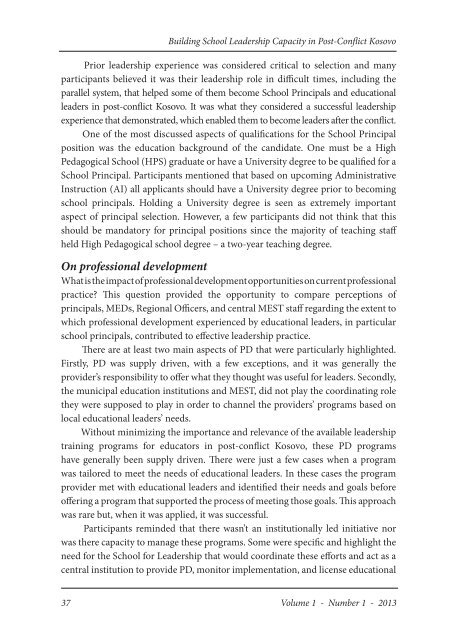Download - qendra per arsim demokratik
Download - qendra per arsim demokratik
Download - qendra per arsim demokratik
Create successful ePaper yourself
Turn your PDF publications into a flip-book with our unique Google optimized e-Paper software.
Building School Leadership Capacity in Post-Conflict KosovoPrior leadership ex<strong>per</strong>ience was considered critical to selection and manyparticipants believed it was their leadership role in difficult times, including theparallel system, that helped some of them become School Principals and educationalleaders in post-conflict Kosovo. It was what they considered a successful leadershipex<strong>per</strong>ience that demonstrated, which enabled them to become leaders after the conflict.One of the most discussed aspects of qualifications for the School Principalposition was the education background of the candidate. One must be a HighPedagogical School (HPS) graduate or have a University degree to be qualified for aSchool Principal. Participants mentioned that based on upcoming AdministrativeInstruction (AI) all applicants should have a University degree prior to becomingschool principals. Holding a University degree is seen as extremely importantaspect of principal selection. However, a few participants did not think that thisshould be mandatory for principal positions since the majority of teaching staffheld High Pedagogical school degree – a two-year teaching degree.On professional developmentWhat is the impact of professional development opportunities on current professionalpractice? This question provided the opportunity to compare <strong>per</strong>ceptions ofprincipals, MEDs, Regional Officers, and central MEST staff regarding the extent towhich professional development ex<strong>per</strong>ienced by educational leaders, in particularschool principals, contributed to effective leadership practice.There are at least two main aspects of PD that were particularly highlighted.Firstly, PD was supply driven, with a few exceptions, and it was generally theprovider’s responsibility to offer what they thought was useful for leaders. Secondly,the municipal education institutions and MEST, did not play the coordinating rolethey were supposed to play in order to channel the providers’ programs based onlocal educational leaders’ needs.Without minimizing the importance and relevance of the available leadershiptraining programs for educators in post-conflict Kosovo, these PD programshave generally been supply driven. There were just a few cases when a programwas tailored to meet the needs of educational leaders. In these cases the programprovider met with educational leaders and identified their needs and goals beforeoffering a program that supported the process of meeting those goals. This approachwas rare but, when it was applied, it was successful.Participants reminded that there wasn’t an institutionally led initiative norwas there capacity to manage these programs. Some were specific and highlight theneed for the School for Leadership that would coordinate these efforts and act as acentral institution to provide PD, monitor implementation, and license educational37Volume 1 - Number 1 - 2013


